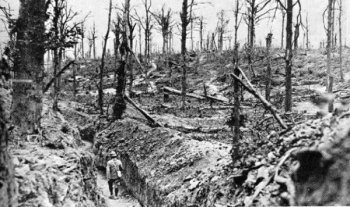
|
18A029 The Great Polluter by Jim Davies, 7/17/2018
The recent departure of Mr Pruitt from his perch at the top of the EPA caused great rejoicing among archists, for he generally favors a reduction in its size and scope, and his boss says he agrees. Too bad Pruitt could not keep his fingers out of the till; Lord Acton's dictum about power corrupting has a long reach. The episode made me wonder about having a government department to "protect the environment." The more I wondered, the more ridiculous and hypocritical it seems. It's really the fox in the hen house.
What kind of people most hurt the environment? - seems to me there are three groups. First comes accidental pollution. The culprits meant no harm at all, but were inattentive at the wrong moment. Some may be more negligent than others, but we're all fallible and accidents can never be cut to zero. The best that can be done is to make machines as fail-safe as can be, and to leave the motivation (to exercise care) where it belongs. Thus, nobody deliberately drives his oil tanker on to submerged rocks, but shipwrecks do happen and the captain of Exxon Valdiz may be distracted at the wrong moment. Nobody purposely uncaps a gusher deep under the Gulf, but BP and their subcontractors may make a chain of errors that have the same result. So long as the folk who make the mess pay to clean it up, we have either to suffer the occasional bad spill or to reverse a good deal of the many benefits of civilization. Then secondly there are hooligans - and I refer not to my friend Kent McManigal, but to those who deliberately externalize the cost of disposing of their trash. The side of my road is littered with cans and bottles once holding drinks - and mostly soft drinks, not beer; which suggests they came from cars driven by kids aged 16 to 21. Those still most heavily influenced by government school propaganda. Deduction: that propaganda taught them not responsibility and respect for others' property, but reliance on EPA-like government departments to clean up all mess. It's not just careless kids; there is a huge floating island of trash in the Pacific, choked with plastic and other garbage, highly hazardous to fish and to small ships and their propellers. It's brought together by ocean currents, but originated when ships' captains allowed crews to toss trash overboard. All over the world governments control "education", and those same lessons are evidently omitted even from schools of seamanship. And so to the prime source of all pollution: government itself. The Communist régimes in China and Eastern Europe monopolized heavy industry and ran furnaces so badly as to poison the air with effluents. The Chernobyl disaster in the USSR is well known. When industry is owned by people with their own money at stake who know they are responsible for cleaning up any mess, there can be no greater incentive to avoid making one; but when it's run by bureaucrats who simply steal such money from uninvolved third parties, the incentive can hardly be more trivial. There are two ways in which the great benefit of nuclear power poses danger to the environment. Firstly, generators are either operated by such bureaucrats directly, or controlled by them indirectly as in the US; and their prime folly here was to enact Price-Anderson in 1957. This placed a legal limit on the liability of nuclear power plant owners, in the event of failure in a manner damaging to nearby populations. Without that limit, owners would have proceeded with more care, no doubt considerably more slowly. Nukes are a fine idea, but haste in design and construction can be deadly; we are very lucky that the minor mis-hap at Three Mile Island was not very much worse. In Japan, tight government control of where and how nuclear power plants were built led to one being located at Fukushima, with foundations at sea level in an area very well known for frequent tsunamis, and right on a fault line producing frequent earthquakes. Radiation from the disaster drove nearly half a million from their homes. The second danger from nukes is the obvious one of weapons and their testing. The US Government made H-bombs at a plant in Hanford, WA and it remains the largest nuclear-contaminated area in the country, affecting the lower reaches of the Columbia River. That's just by making these 60,000 nuclear weapons. Then some of them were tested, often in the air or ocean; for example the islands of Bikini in the Pacific were cleared of their populations and blasted by two H-bombs, with radioactive dust and vaporized sea water sent up to circle the Earth. Earlier, two far smaller bombs had been used in war, on the say-so of the Socialist Clement Atlee and the Democrat Harry Truman. A quarter of a million human beings died, and two cities were reduced to radioactive rubble; housing being a vital part of our "environment" I count that as a major assault on the environment as well as an infamous act of mass murder.
During the same war the FedGov actively assisted Germany's enemies by shipping fuel across the Atlantic, so U-boats were deployed to sink the oil tankers. The coastlines of Europe have ever since been spoiled by a line of black residue, the heaviest fraction of the oil that escaped from the wrecks.
This is what governments do, and is a measure of their respect for the natural world; and while war is the time when they do their worst, they work against the environment in peacetime too. Visitors to the US who arrive at JFK travel in to New York City past some of the worst slums in the world, all of them part of the environment and all of them ruined by local government acts in the form of "rent control". So as to win votes from tenants, laws are written to prevent landlords raising rents to levels that allow them to keep the properties in good condition and still to clear a profit. Predictable and actual result: once-handsome housing, devastated. Come the Zero Government Society, there will of course be no EPA. Nor will there be any offensive wars, such as all those mentioned above; and any defensive ones will not be waged by government but by individuals in the manner of porcupines; I doubt that there will be any of those either but if there are, damage to the environment will be minimal. And being resilient, it will recover well from the Age of Government. |
|
||||||||||||||||||||||||||||||||||||||||||

 "The environment" is a rather broad term. It encompasses everything around us; home, air, water, ocean, neighborhood, flora, fauna, forests, the lot. Somehow humanity managed to preserve it with little effort for almost 50,000 years but just in the last 50, archists and job-seeking bureau-rats have found it vital to have a watchdog - or watchfox - to take care of it.
"The environment" is a rather broad term. It encompasses everything around us; home, air, water, ocean, neighborhood, flora, fauna, forests, the lot. Somehow humanity managed to preserve it with little effort for almost 50,000 years but just in the last 50, archists and job-seeking bureau-rats have found it vital to have a watchdog - or watchfox - to take care of it. Nukes form, however, by no means the limit of government wreckage of the environment when it goes about its principal business of waging war. In Vietnam, the FedGov created and deployed "Agent Orange" to defoliate vast tracts of forest, under which its enemies du jour were thought to be hiding. It made gasoline into a gel (Napalm) and used it to burn forests, villages and human beings in terrible infernos. In WW2 it systematically bombed most German cities into rubble, and - again - the houses people live and work in are integral parts of the environment. The Soviet government did an even more thorough job of destruction in Berlin, using mainly artillery shells. Dresden, and several Japanese cities, were fire-bombed so viciously that every home was destroyed and the smoke rose to the upper atmosphere as if from a volcano.
Nukes form, however, by no means the limit of government wreckage of the environment when it goes about its principal business of waging war. In Vietnam, the FedGov created and deployed "Agent Orange" to defoliate vast tracts of forest, under which its enemies du jour were thought to be hiding. It made gasoline into a gel (Napalm) and used it to burn forests, villages and human beings in terrible infernos. In WW2 it systematically bombed most German cities into rubble, and - again - the houses people live and work in are integral parts of the environment. The Soviet government did an even more thorough job of destruction in Berlin, using mainly artillery shells. Dresden, and several Japanese cities, were fire-bombed so viciously that every home was destroyed and the smoke rose to the upper atmosphere as if from a volcano.  During WW1 fields and forests were ruined by four years of futile trench warfare and artillery bombardment.
During WW1 fields and forests were ruined by four years of futile trench warfare and artillery bombardment.








